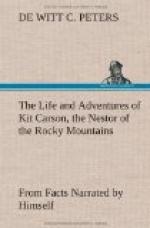The work of preparation was now commenced by the different parties to the expedition. All of the arrangements having been finally completed, the bold and hardy band soon started upon their journey. Their route lay over the vast, and then unexplored territory, bounded by the Rocky Mountains on the one side, and the Missouri River on the other. Before them lay, stretched out in almost never-ending space, those great prairies, the half of which are still unknown to the white man. Crossing the plains in 1826 was an entirely different feat from what it is at this day. Where, then, were the published guides? Where were the charts indicating the eligible camping grounds with their springs of pure water? These oases of the American Sahara were not yet acquainted with the white man’s foot. The herds of buffaloes, the droves of wild horses, knew not the crack of the white man’s rifle. They had fled only at the approach of the native Indian warrior and the yearly fires of the prairie. It was a difficult task to find a man who had gazed on the lofty peaks of the mountain ranges which formed a serpentine division of the vast American Territories, or who had drank the waters at the camping places on the prairies. The traveller at that day was, in every force of meaning which the word extends, literally, an explorer, whose chosen object was the task of a hero. The Indians themselves could give no information of the route beyond the confined limits of their hunting ranges. The path which this pioneer party entered was existent only in the imagination of the book-making geographer, about as accurate and useful from its detail, as the route of Baron Munchausen to the icelands of the North Pole on the back of his eagle. The whole expanse of the rolling prairie, to those brave hearts, was one boundless uncertainty. This language may possibly be pronounced redundant. It may be in phrase; it is not in fact. The carpet-knight, the holiday ranger, the book-worm explorer, knows but little of the herculean work which has furnished for the world a practical knowledge of the western half of the North American continent. We shall see in the progress of this work whether the adventures of Kit Carson entitle him to a place in the heart of the American nation on the same shelf with his compeers.




